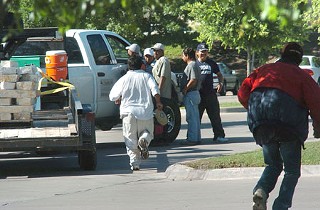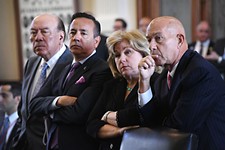Immigration Folly at the Lege
By Richard Whittaker, Fri., April 27, 2007
Sweeping immigration reforms passing through the Texas House could severely affect the way the city does business. On April 16, the House State Affairs Committee discussed eight bills that covered such issues as banning local government from accepting consular documents as ID and auditing how much is spent by each agency on providing services to undocumented migrants. On the list was House Bill 904, by Rep. Bill Zedler, R-Arlington. Opposed by the cities of Austin, Houston, San Antonio, and Plano, it would ban local governments from using public money to set up day labor camps used by undocumented migrants. If passed, the attached fiscal note says, cities would have to screen all laborers and absorb all the costs.
"This is not a blanket prohibition on day labor centers. This is a prohibition on using public funds to support a day labor center that knowingly facilitates the employment of undocumented workers. In legal parlay, that knowingly is an important definer in the bill," said Zedler staff member Shannon Duffy. (Note: The word "knowingly" does not appear in the text of the bill.)
In a statement, Rep. Eddie Rodriguez, D-Austin, called HB 904 "punitive legislation … which targets immigrants." He added that it would "impact our local economies and not address the underlying issue of needing comprehensive immigration reform." Rodriguez has his own day labor bill, HB 456, which would protect day laborer wages.
HB 904 could directly affect the First Workers' Day Labor Center, run by Austin/Travis Co. Health and Human Services. Located on North I-35, the center provides a covered area where day laborers can meet potential employers. The city does not get involved in any transactions or check IDs. It simply provides police officers for safety purposes, a license-plate-watch service, and referrals to advocacy and law enforcement in cases of abuse or nonpayment. According to city figures, around 150 workers use the center every day; it's been so successful that the city is looking for a second site in South Austin.
David Lurie, Austin/Travis HHS director, spoke before the committee against the bill. In an interview, he said, "It would impede on our ability to operate a facility that has been to the benefit of our community. We feel we should have the flexibility at the local level to decide what's best for us." He said the day labor center is "not an immigrant program, so we have no way to check where anyone is from. It's open to everyone, and we've found that the people who use it reflect the city's demographics and diversity." He called the center a safe alternative to the unofficial, impromptu street-corner pickup points, which were "very chaotic, very unsafe, and not something we're like[ly] to go back to."
Many of the bills before the State Affairs Committee are either badly written, pointless, or redundant, said Luis Figueroa, legislative staff attorney for the Mexican American Legal Defense and Educational Fund. "A prime example is HB 2998, which gets peace officers to verify immigration status and then report this to the U.S. Citizenship and Immigration Services. This is not the right agency. It's supposed to be ICE [Immigrations and Customs Enforcement]," Figueroa said.
The Travis Co. Sheriff's Department has no policy on asking about immigration status prior to arrest. Only when a person reaches jail do they have to say where they were born. If they are from outside the U.S., the department contacts ICE. "But there's no database available to us," said Roger Wade, public information officer for the Sheriff's Department. The Austin Police Department declined to comment about its policy on checking immigration status.
According to Michael McDonald, assistant city manager for public safety, Austin does not inquire about immigration status because "historically, we really haven't seen it as our responsibility. What we concentrate on is violent and property crimes, and we leave immigration to the federal authorities."
Asking people about their immigration status could even get in the way of essential policing. "What's most important to us is that victims and witnesses feel comfortable coming forward to us," McDonald said. "If they feel we're going to arrest them for something that is a federal issue, that gets in the way."
For Figueroa, HB 2998 is typical of many of the bills. "It's putting somebody else in the role of immigration officer, when they don't have the expertise to do that," he said. "There are provisions that have employees of the state verifying documents that they don't understand or know how to verify. It seems a waste of resources."
Got something to say on the subject? Send a letter to the editor.









